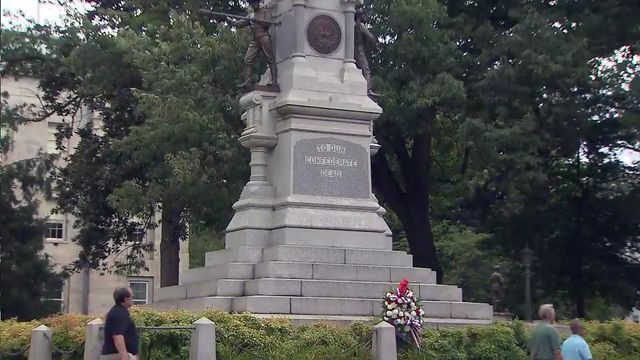Debate in NC over Confederate monuments, not flag
As South Carolina debates the future of the Confederate battle flag that flies outside the state capitol in Columbia, S.C., some in North Carolina are questioning Confederate monuments on public property.
Posted — UpdatedA state database of Civil War monuments shows more than 70 of North Carolina's 100 counties have at least one memorial to the Confederacy, including 17 counties that have multiple monuments. The list doesn't even include federal and state highway markers, historic trails and private monuments linked to the Confederacy.
Most of these memorials were built to honor Confederate soldiers who served or lost their lives in the war. To many, they represent heritage and history, but to a growing number, they reflect oppression and racism.
Last week, vandals spray-painted a marker in a Durham-owned cemetery, and similar vandalism occurred over the weekend at the "Silent Sam" statue on the University of North Carolina at Chapel Hill campus.
"I think that you have to separate the monuments that commemorate soldiers that have fallen versus a symbol that has been adopted by groups that, I think, promote hate," said Thomas Barbour of Raleigh, referring to the battle flag.
"If your displaying it in public on public grounds, I think it's one and the same," Matt Varghese of Raleigh said. "The South wanted to keep slavery, and that's really what they were fighting for. So, why honor it?"
Mecklenburg County leaders plan to discuss Tuesday whether to remove a Confederate monument in Charlotte that depicts the battle flag.
Keith Hardison, director of state historic sites and properties for the Department of Cultural Resources, argues that more monuments, not fewer, is the answer to the debate.
"Southerners were determined that they were going to leave their history – their version of their history, if you will – in bronze and stone and granite. But where are the other monuments?" Hardison said.
Rather than stifling debate by removing painful reminders of the past, he said, why not provoke dialogue by adding memorials to Native Americans, civil rights leaders and others to complement those honoring the Confederacy?
"If we're going to spend energy on monuments, that's what we ought to be spending energy on – more, not fewer," he said.
Helena Bates of Raleigh added that removing monuments creates more problems.
"In a perfect society, they should come down, but then where do you draw the distinction? What do you pick next?" Bates said.
• Credits
Copyright 2024 by Capitol Broadcasting Company. All rights reserved. This material may not be published, broadcast, rewritten or redistributed.






